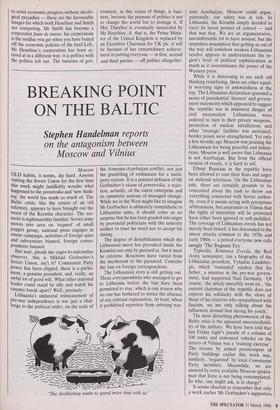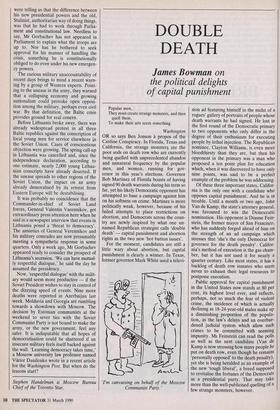BREAKING POINT ON THE BALTIC
Stephen Handelman reports
on the antagonism between Moscow and Vilnius
Moscow OLD habits, it seems, die hard. Anyone visiting the Soviet Union for the first time this week might justifiably wonder what happened to the perestroika and 'new think- ing' the world has made so much of. The Baltic crisis, like the return of an old infirmity, appears to have brought out the worst of the Kremlin character. The sce- nario is nightmarishly familiar: Soviet army moves into area on 'request' of small Puppet group, national press engages in smear campaign, activities of foreign spies and subversives blamed, foreign corres- pondents banned.
But wait, pleads the eager-to-rationalise observer, this is Mikhail Gorbachev's Soviet Union, isn't it? Communist Party power has been clipped, there is a parlia- ment, a genuine president, and, really, an awful lot of good will. What other national leader could stand by idly and watch his country break apart? Well, precisely. Lithuania's unilateral reinstatement of pre-war independence is not just a chal- lenge to the political order, on the scale of the Armenia-Azerbaijan conflict, nor just the grumbling of enthusiasts for a multi- party system. It is a pointed defiance of Mr Gorbachev's vision of perestroika, a rejec- tion, actually, of the entire enterprise and its optimistic notions of managed change. While we in the West might like to imagine Mr Gorbachev is ultimately sympathetic to Lithuanian aims, it should come as no surprise that he has been goaded into anger by provincial politicians with the temerity neither to trust his word nor to accept his timing.
The degree of destabilisation which the Lithuanian move has provoked inside the Kremlin can only be guessed at, but it must be extreme. Reactions have varied from the incoherent to the paranoid. Consider the ban on foreign correspondents.
The Lithuanian story is still getting out. Those correspondents who managed to get to Lithuania before the ban have been permitted to stay, which is one reason why no one has bothered to notice the absence of any rational explanation. At least, when it prohibited reporters from entering war- The Archbishop wants to spend more time with us.' torn Azerbaijan, Moscow could argue, paternally, our safety was at risk. In Lithuania, the Kremlin simply decided to exert its latent powers of control — and that was that. We are an argumentative, uncomfortable lot to have around, but the unspoken assumption that getting us out of the way will somehow weaken Lithuanian resolve appears to underestimate the re- gion's level of political sophistication as much as it overestimates the power of the Western press.
While it is distressing to see such old thinking resurfacing, there are other equal- ly worrying signs of awkwardness at the top. The Lithuanian declaration spawned a series of presidential 'decrees' and govern- ment statements which appeared to suggest the republic was in imminent danger of civil insurrection. Lithuanians were ordered to turn in their private weapons, protection of nuclear installations and other 'strategic' facilities was increased, border points were strengthened. Yet only a few months ago Moscow was praising the Lithuanians for being peaceful and indust- rious. Moscow is well aware that Lithuania is not Azerbaijan. But from the official version of events, it is hard to tell.
Ethnic Russians in the republic have been allowed to vent their fears and anger on national television. On the Lithuanian side, there are certainly grounds to be concerned about the rush to throw out everything connected with Soviet author- ity, even if it means acting with precipitate arbitrariness, but assurances in Vilnius that the rights of minorities will be protected have either been ignored or soft-pedalled. The coverage of Lithuanian events has not merely been biased, it has descended to the smear attacks common to the 1970s and early 1980s — a period everyone now calls smugly 'The Stagnant Era'.
Typically, Krasnaya Zvezda, the Red Army newspaper, ran a biography of the Lithuanian president, Vytautas Landsber- gis, which 'reminded' readers that his father, a minister in the pre-war govern- ment, had supported Nazi Germany. 'Of course,' the article smoothly went on , 'the current chairman of the republic does not express his solidarity with the views of those of his relatives who sympathised with fascism, we are only talking about the influences around him during his youth.'
The most disturbing phenomenon of the Baltic crisis is the apparent uncontrollabil- ity of the military. We have been told that last Friday night's parade of a column of 100 tanks and armoured vehicles on the streets of Vilnius was a 'training exercise'.
The seizure by armed paratroopers of Party buildings earlier this week was, similarly, 'requested' by local Communist Party members. Meanwhile, we are assured by every available Moscow spokes- man that force is not being contemplated. So who, one might ask, is in charge?
It seems churlish to remember that only a week earlier Mr Gorbachev's supporters were telling us that the difference between his new presidential powers and the old, Stalinist, authoritarian way of doing things, was that he had to work through Parlia- ment and constitutional law. Needless to say, Mr Gorbachev has not appeared in Parliament to explain what the troops are up to. Nor has he bothered to seek approval for his manner of handling the crisis, something he is constitutionally obliged to do even under his new emergen- cy powers.
The curious military unaccountability of recent days brings to mind a recent warn- ing by a group of Western experts. Point- ing to the unease in the army, they warned that a collapsing economy and growing nationalism could provoke open opposi- tion among the military, perhaps even civil war. By that definition, the Baltic crisis provides ground for real conern.
Before Lithuania broke away, there was already widespread protest in all three Baltic republics against the conscription of local young men for service elsewhere in the Soviet Union. Cases of conscientious objection were growing. The spring call-up in Lithuania was cancelled and, since the independence declaration, according to one estimate, nearly 2,000 young Lithua- nian conscripts have already deserted. If the unease spreads to other regions of the Soviet Union, the impact on an army already demoralised by its retreat from Eastern Europe will be destabilising.
It was probably no coincidence that the Commander-in-chief of Soviet Land forces, General Valentin Varennikov, got extraordinary press attention here when he said in a newspaper interview that events in Lithuania posed a 'threat to democracy'. The anxieties of General Verennikov and his military comrades are now presumably meeting a sympathetic response in some quarters. Only a week ago, Mr Gorbachev appeared ready to consider the prospect of Lithuania's secession. 'We can have mutual- ly respectful dialogue,' he said the day he assumed the presidency.
Now, 'respectful dialogue' with the milit- ary would seem more productive — if the Soviet President wishes to stay in control of the dizzying speed of events. Nine more deaths were reported in Azerbaijan last week. Moldavia and Georgia are rumbling towards a showdown with Moscow. The decision by Estonian communists at the weekend to sever ties with the Soviet Communist Party is not bound to make the army, or the new government, feel any safer. It is indisputable that all hopes of democratisation could be shattered if an insecure military feels itself backed against the wall. 'Learning democracy takes time,' a Moscow university law professor named Viktor Danilenko wrote in a recent article for the Washington Post. But when do the lessons start?
Stephen Handelman is Moscow Bureau Chief of the Toronto Star.



























































 Previous page
Previous page